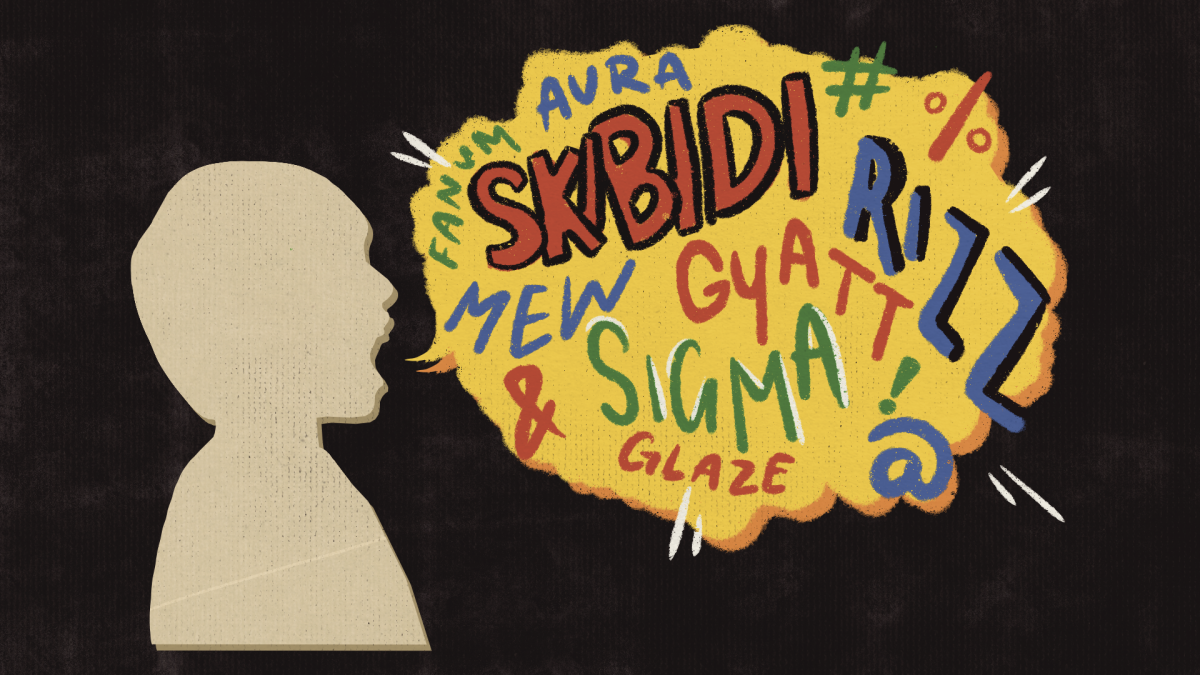Editor’s Note: This article contains reference to sexual assault.
From “skibbidi” to “sigma,” it’s hard for those of us born before 2010 to keep up with the newest methods of communication. Generation Alpha, known as the “iPad kids,” are now old enough to be on social media — and to develop their own slang at light-speed.
Ever since language became easier to share across the internet, slang development has steadily accelerated. But with Gen Alpha, it feels quicker than ever.
But, the internet has been around for two decades. What’s different this time?
Typically, slang terms come with a definition, but Gen Alpha’s vocabulary is largely composed of words that can be applied to anything and everything, and that’s why they’re able to make it up so fast. What’s also relatively new is the repetitive algorithms that turn over trends before you’ve even heard about them.
At this pace, we’re going to end up with an entire language that none of us prehistorics will bother to learn.
I’m not ready to call myself old or for the slang I use to be considered outdated, but I’ve made more trips to Urban Dictionary than I’d like to admit, frequently to no avail.
Brody McCurdy, a Ph.D. student in communication, rhetoric and digital media, said this change is accelerated by the modern social media landscape.
“The transmission of [slang], or the development of the slang that is being used, is probably facilitated a lot more easily over Tiktok or social media where this slang can catch on quicker,” McCurdy said.
Back in 2016, Instagram caused a major controversy when the platform did away with its chronological feed in favor of an interest-based algorithm. Other social media quickly followed suit, essentially becoming carbon copies of one another with differing aesthetics, allowing for trends to spread like wildfire from one app to the next in an effort to compete for user engagement.
Like millennials losing Blockbuster, pre-existing users required adjustment to this change, making them less likely to participate in this new transmission of slang. This Instagram algorithm is native for Gen Alpha, so fast-paced transmission is the norm.
Interestingly, Instagram made this switch a few months before Musical.ly officially rebranded to TikTok. Relative to internet veterans, this app is new. Gen Alpha, however, grew up with it.
McCurdy provided other catalysts for development, “algospeak” being one of them.
According to McCurdy, algospeak is “when people are on TikTok and they can’t say a certain word because they think they’ll get flagged. Things like ‘SA’ instead of ‘sexual assault’ or ‘pew, pew’ instead of ‘gun.’”
Moreover, a lot of Gen Alpha slang comes from video games.
“Fanum tax,” coined by Twitch streamer Fanum, is a notable one. Video games have been around for some time, but the ability to watch others play games on streaming services is new. If it weren’t for Twitch, “fanum tax” would be nonexistent.
Gen Z dominated social media for the last several years, and Millenials dominated in the very beginning, each time creating our unique vocabularies quicker than the last. Only now, it seems Gen Alpha’s is replacing Gen Z’s prematurely.
As a rite of passage, the newest generation is taking full reign of social media, whether we’re ready or not.
“The interesting part of slang is it’s often associated with particular in-groups,” McCurdy said. “You want to sound cool. You want to sound like you’re a teenager. … The minute that older people pick it up, or the minute that a politician tries to do a meme where they use slang, it’s instantly uncool, right?”
Like Gen Z cringes at Millennials and Millenials cringed at Gen X, our slang is being considered outdated when it’s not even a few years old.
This ultrasonic speed at which slang is developing comes down to the fact that Gen Alpha has access to more sophisticated technology than previous generations — and they take full advantage of it.
It’s a sign of the times. Continuing at this rate, Gen Alpha will soon be unintelligible to generations who aren’t used to this unusually high-speed transmission of language.
I swore that I’d never be so averse to the lifestyles of posterity, like my parents swore before me. But, as was the case with QR code menus, deep down, everyone has an inner Boomer.














